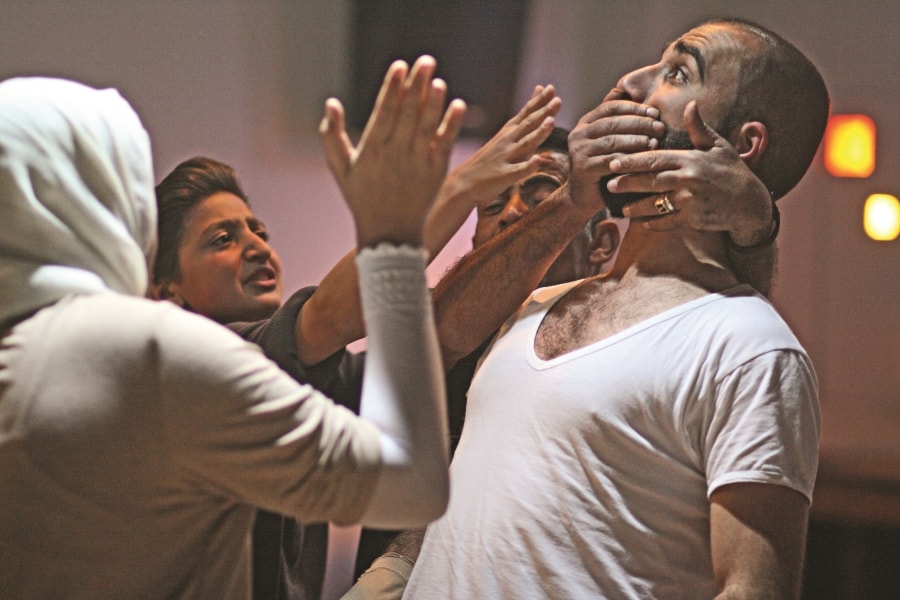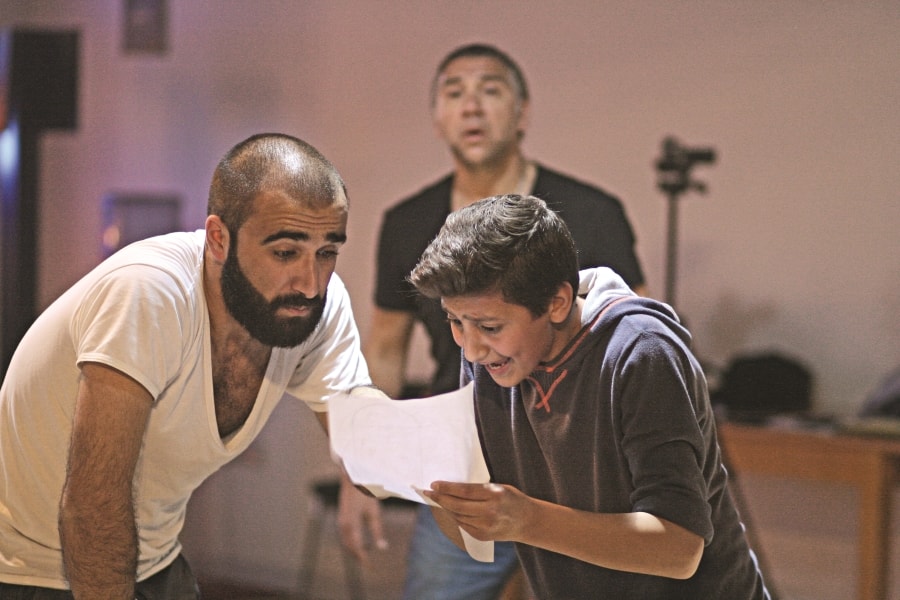With one hand, 15-year-old Eman al-Shayab reaches down and detaches her prosthetic right leg. Defiantly she whirls it around and mimics throwing it at a fighter plane that has just dropped the barrel bombs that severed her real leg. In her imagination, the severed limb strikes the plane and sends it into a tailspin. Sobbing, the pilot asks, “Why have you made me crash?”
In the play Love Boat or سفينة الحب (Sofinat al-Hobe)—no relation to the ’70s TV show—which was performed in April in Amman, Jordan, at the French Institute’s Cultural Center, Syrian actor/director Nawar Bulbul used comedy, singing, and dancing to reveal the resilience of Syrian refugees even in the face of physical violence, imprisonment, and loss of life. “Theatre is like medicine,” Bulbul told me, “but it must not just show people crying and feeling pain. The people also laugh and find happiness.”
Before traveling to Amman for field research on my dissertation (which focuses on performance and citizenship in Syrian refugee camps), I read about Bulbul’s adaptation of King Lear for 100 children in Zaatari Refugee Camp, and I decided to contact him on my third day in Amman through Facebook. Ten minutes after sending the message, he invited me to his home in Jabal Weibdeh, an artistic enclave filled with cafés and niche restaurants. Despite the fact that I arrived late, Bulbul was very generous in hospitality and in sharing his story.
After I’d interviewed him for an hour, Bulbul said, “Let’s continue this conversation, but on the way to rehearsal.” After first picking up his wife and daughter, we arrived at the space where the actors were already running a scene from Don Quixote. In the center of the room Ibrahim Surhan, a Syrian boy who severely damaged both of his legs running from an attacking plane, used one of his crutches to fight an evil windmill. His resilience in that moment became a story I needed to tell. Within a week I was attending rehearsals every night, and I’d end up Love Boat’s sound and light designer.

Love Boat is a work of fiction that draws from the real stories of its six amateur actors, all refugees from Syria, and weaves them together along with excerpts from canonical Western texts. Its backdrop is the story of a theatre group separated by the war in Syria that has rejoined somewhere on the Mediterranean coast to travel by boat to Germany, where they plan to seek refuge. On the way, the play’s fictional troupe aims to perform theatre in every country they pass through. In the meantime, to keep their fears at bay, the group decides to rehearse scenes from the plays they will perform. The carefully curated list includes The Knights by Aristophanes, Servant of Two Masters by Goldoni, Don Quixote by Cervantes, Tartuffe by Molière, Faust by Goethe, and King Lear by Shakespeare. Each scene that Bulbul chose relates to the political and human conditions of Syrian refugees. For example, in Bulbul’s adapted version of The Knights, four of the actors perform a scene in which Nicias and Demosthenes steal a set of oracles that their fellow servant, Cleon, has kept hidden. These oracles predict that the evil Cleon will eventually rise up to rule the polis, but will be replaced by a sausage seller. As Nicias and Demosthenes read the oracles, a sausage seller wanders by and the two servants convince him that he will become the ruler. An angry Cleon storms out and challenges the legitimacy of the sausage maker’s claim.
The scene hints at a narrative of people overthrowing a dictatorial ruler and replacing him with someone who is not hungry for power. While the message is not deeply hidden, Bulbul’s use of comedy and his ability to carefully negotiate the tenuous politics of authority and conservative social mores allows the actors to speak about their stories and desire for revolution in Syria.

Until 2011 Nawar Bulbul was a famous actor in Syria. Primarily known for his role as Abu Youssef in the show Bab al-Hara (a popular Ramadan drama from 2005 to 2011), Bulbul also appeared in movies and won several awards for acting at international theatre festivals in Japan, Canada, and the United States. Bulbul’s career took an abrupt turn when he decided to join the protestors opposing the regime of Bashar al-Assad. According to Bulbul, 24 hours after he participated in the protest, “The news media began putting stories about me being in the streets with the protestors.” Overnight he went from being a respected TV and film actor to being targeted by the Syrian government. At one point he was offered a way out.
“All I needed to do was say on television that I was wrong for supporting the protestors and Bashar al-Assad has helped make our country great, and they would forget everything,” he recalled. But Bulbul refused and had to flee to Lebanon and eventually France, where his wife and children had moved the year prior. Eventually he and his family would relocate to Amman, Jordan’s capital, to find work and wait for the revolution in Syria to end. It was in Amman, where they currently live, that Bulbul began working with refugees. First he directed the adaptation of King Lear in Zaatari. The following year he staged an innovative version of Romeo and Juliet in Amman. In this production the performers playing the Montagues were acting live in Amman and all of the Capulets appeared via Skype from Bulbul’s hometown of Homs. Love Boat is the third play in Bulbul’s ongoing revolution theatre project.
The cast of Love Boat is made up entirely of people who left Syria due to the violence and political unrest that began in 2011. Some of the actors, such as Adnan Rejjal, were fortunate enough to have a Jordanian passport and found refuge in Amman with little trouble. But most of the actors had a far more difficult time escaping Syria and arriving in Amman. For instance, Eman al-Shayab and her sister Inez fled their home in Daraa, Syria, after a barrel bomb dropped from a Russian plane, killing two of their brothers, spraying Inez with shrapnel, and severing Eman’s leg. The sisters’ parents stayed in Daraa, but Eman and Inez registered as refugees with UNHCR, the refugee agency of the United Nations. Both lived in Zaatari Refugee Camp for a short time until they were temporarily taken in by a nonprofit organization in Amman that assists Syrian children with serious physical traumas. That’s where Bulbul met Eman al-Shayab, which led to her involvement in Love Boat.
Through her experiences in Amman, particularly in this production, al-Shayab said she has found a community and friends. “Love Boat gives me a chance to express my feelings to the rest of the world about what the people of Syria are going through,” she explained. “But it also lets me do something good for my country by showing our courage.”
Other cast members in Love Boat echo al-Shayab’s sentiments. “The message is clear,” said Mahmoud Saadiqa, a Palestinian living in the Yarmouk Refugee Camp. “We are here, we are surviving, and we are going to believe in life.” Mohammed Kabbour, who was imprisoned and tortured in Damascus for several months, added, “Our message is for the West in general. We want them to know who are the Syrians.”
Theatre aimed at trauma recovery often focuses on allowing the actors to “relive” their stories onstage, thus breaking the psychological hold that traps the traumatized person in a destructive feedback loop in which they relive their trauma continuously, without the frame of a script. However, this kind of practice often risks reinforcing the notion of helplessness that is prevalent in many Western narratives about trauma. This is not only the case for representations of trauma with refugees, but also for soldiers, victims of domestic violence, or virtually anyone labeled with PTSD. In his book Performance Affects, Applied Theatre practitioner James Thompson argues instead for a greater focus on the act of creating something beautiful. While Thompson does not dismiss the value of storytelling for people affected by traumatic events, he suggests that it is often employed a-culturally, which has as much chance of causing harm as it does enabling recovery. On the other hand, he says, when the focus is on creating something beautiful, the actors are empowered to explore their own subject matter in a culturally specific manner.
In the case of Love Boat, this empowerment speaks more to the ability of these incredible people to survive rather than to their desire or need for pity. When Bulbul began putting together the script of Love Boat, he knew that he wanted to include the stories of the actors. But instead of asking them to relive their stories onstage, Bulbul just had the actors tell what happened to them as if in a conversation talking to their friends. He gave them power over what sort of emotion they wanted to convey. Much to his surprise, when al-Shayab began telling her story, instead of drawing from anger or sadness, as one might expect, she chose to use comedy. Al-Shayab did not scream or cry about the loss of her leg or the murder of her brothers. Rather, she created a beautiful alternative world where she could pick up her leg and use it to defeat the pilot who took so much from her. After her triumph, al-Shayab sat back down in her chair, took a sip of her tea, and declared, “It was the best tea I have ever had.”
Researcher, artist, and activist Bart Pitchford is a Ph.D. candidate at the University of Texas at Austin. His dissertation focuses on performance and citizenship in the refugee camps of Zaatari and Azraq in Jordan.


